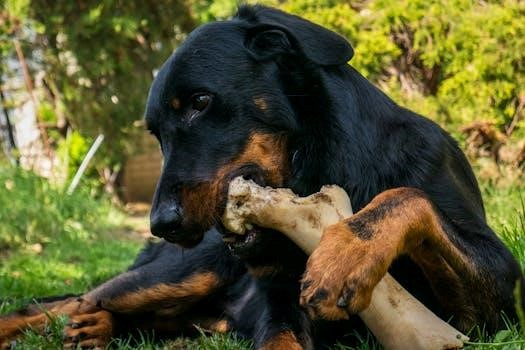Overview of the 21-Day Bone Broth Diet
The 21-day bone broth diet is a structured program combining Paleo principles with intermittent fasting, typically involving five days of Paleo eating and two days of bone broth fasting per week, promoting gut health and weight management.
The 21-Day Bone Broth Diet Plan, popularized by Dr. Kellyann Petrucci, is a dietary approach that integrates a Paleo-style eating pattern with the practice of intermittent fasting, strategically utilizing bone broth. This plan is designed as a 21-day cycle, promoting a combination of nutritional intake and fasting periods. The core concept revolves around alternating between five days of consuming a diet rich in lean proteins, non-starchy vegetables, and healthy fats, while incorporating one to three cups of bone broth, and two days of fasting, during which three to six cups of bone broth are consumed. The diet aims to improve gut health, reduce inflammation, and support weight management through this structured approach.
The Core Principles⁚ Paleo Diet and Intermittent Fasting
The 21-Day Bone Broth Diet is fundamentally built upon two key principles⁚ the Paleo diet and intermittent fasting. The Paleo diet emphasizes whole, unprocessed foods, mirroring the eating habits of our ancestors, focusing on lean proteins, fruits, vegetables, and healthy fats, while excluding grains, legumes, and processed sugars. Intermittent fasting involves cycling between periods of eating and voluntary fasting, in this plan, two days a week are dedicated to consuming only bone broth. This combination aims to optimize metabolic processes, enhance nutrient absorption, and promote a healthy inflammatory response. By adhering to these principles, the diet seeks to provide a framework for both weight management and overall well-being.

Phases of the 21-Day Plan
The 21-day plan is structured into distinct phases⁚ non-fasting days with Paleo eating and bone broth, fasting days with bone broth only, and a maintenance phase after the 21 days.
Non-Fasting Days⁚ Paleo Diet and Bone Broth Consumption
During the five non-fasting days of the 21-day bone broth diet, you adhere to a Paleo-style eating plan. This involves consuming lean proteins such as poultry, fish, and grass-fed beef, along with an abundance of non-starchy vegetables. Healthy fats from sources like avocados, nuts, and olive oil are also included. It’s crucial to avoid processed foods, grains, legumes, and refined sugars. Alongside this Paleo diet, you consume one to three cups of bone broth daily. This combination aims to provide essential nutrients while supporting the diet’s overall objectives, such as reducing inflammation and promoting gut health. The bone broth adds valuable collagen, amino acids, and minerals to the diet.
Fasting Days⁚ Bone Broth Only
The fasting days of the 21-day bone broth diet are characterized by the exclusive consumption of bone broth. For two days each week, all solid foods are eliminated, and the diet consists solely of three to six cups of bone broth throughout the day. This intermittent fasting approach is intended to promote detoxification and gut healing. By restricting calorie intake to only the broth, the body can focus on cellular repair and reduce inflammation. The nutrient-rich bone broth provides vital electrolytes and amino acids, helping to sustain energy levels and minimize discomfort during the fasting period. This phase is critical for achieving the weight loss and health benefits associated with the diet.
The Maintenance Phase
Following the initial 21-day cycle, the maintenance phase of the bone broth diet is crucial for long-term success and sustainability. This phase involves gradually reintroducing a wider variety of healthy, whole foods while continuing to incorporate bone broth into your daily routine. The focus shifts from strict fasting to maintaining a balanced diet that aligns with Paleo principles, emphasizing lean proteins, non-starchy vegetables, and healthy fats. While the rigorous fasting days are reduced, bone broth consumption remains a key component for continued gut health and anti-inflammatory benefits. The maintenance phase is about making the diet a lifestyle rather than a temporary fix, allowing for flexibility while still prioritizing the core principles of the plan.

Benefits of the Bone Broth Diet
The bone broth diet offers several potential benefits, including weight loss, improved gut health, reduced inflammation, and support for skin, joints, and bone health, based on anecdotal evidence.
Potential for Weight Loss
The 21-day bone broth diet is often touted for its weight loss potential, primarily due to its structure of intermittent fasting and reduced calorie intake. By cycling between five days of Paleo-style eating and two days of consuming only bone broth, individuals may experience a calorie deficit, which can lead to weight loss. The fasting days, in particular, significantly limit caloric intake, potentially triggering the body to burn fat stores for energy. It is crucial to note that while some individuals may see a decrease in weight, the long-term effectiveness of this approach for weight management requires additional scientific research. Claims of losing up to 15 pounds in 21 days are common, but these are often based on anecdotal evidence and should be approached with caution. Remember, sustainable weight loss typically involves a holistic approach incorporating a balanced diet and regular exercise. Bone broth can be a part of that process but should not be viewed as a magic bullet.
Improvements in Gut Health
The 21-day bone broth diet is often associated with improvements in gut health, largely attributed to the consumption of bone broth. Bone broth is rich in gelatin, collagen, and amino acids, which are believed to support the integrity of the gut lining. These components may help to reduce inflammation in the digestive tract and promote a healthy gut microbiome. The diet’s emphasis on Paleo-style eating, which eliminates processed foods and potential irritants, can also contribute to a more balanced and functional digestive system. Additionally, the intermittent fasting aspect may give the gut a rest, allowing for better healing and repair. However, the extent of these benefits can vary from person to person. While proponents suggest that this diet aids in healing leaky gut and improving digestion, it’s essential to consult with a healthcare professional for personalized advice.
Anti-Inflammatory Effects
The 21-day bone broth diet is often lauded for its potential anti-inflammatory effects, stemming from its combination of a Paleo-style diet, intermittent fasting, and the inclusion of bone broth. Bone broth contains amino acids like glycine and proline, which are known for their anti-inflammatory properties. The Paleo aspect of the diet, which focuses on whole, unprocessed foods, eliminates common inflammatory triggers like refined sugars and processed carbohydrates. Intermittent fasting may further contribute to reducing inflammation by promoting cellular repair and reducing oxidative stress. The diet’s overall approach aims to lower systemic inflammation, potentially alleviating symptoms associated with inflammatory conditions. However, individual results may vary, and it’s crucial to consult with healthcare professionals for personalized advice and to understand the limitations of the diet for managing specific inflammatory conditions. While some may experience significant improvements, others might not see the same effects, and it’s not meant as a cure for chronic inflammatory diseases.
Benefits for Skin, Joints, and Bones
The 21-day bone broth diet is often associated with potential benefits for skin, joints, and bones, largely due to the high collagen content found in bone broth. Collagen is a crucial protein that supports the structure and elasticity of skin, contributing to a more youthful appearance. The diet’s focus on whole foods and anti-inflammatory practices may also lead to clearer skin by reducing inflammation. For joints, the collagen and other compounds in bone broth, such as glucosamine and chondroitin, may help to reduce pain and improve mobility by supporting cartilage health. Furthermore, the minerals in bone broth, like calcium and magnesium, are essential for maintaining strong and healthy bones. Regular consumption of bone broth, within this diet’s framework, is believed to contribute to overall skeletal health and joint function. While some may see noticeable improvements, individual responses can vary, and it’s important to maintain a balanced approach and seek expert guidance.

Practical Implementation
Implementing the 21-day bone broth diet involves understanding bone broth consumption guidelines, permitted foods during Paleo days, and utilizing recipes for successful adherence to the diet plan.
Bone Broth Consumption Guidelines
During the 21-day bone broth diet, bone broth consumption varies between non-fasting and fasting days. On the five days of Paleo eating, individuals typically consume one to three cups of bone broth daily. These servings are often spread throughout the day, complementing the Paleo-based meals. During the two fasting days, bone broth becomes the primary source of sustenance, with consumption increasing to three to six cups per day. It’s crucial to ensure the bone broth is made from quality ingredients, focusing on slow-simmered bones to extract maximum nutrients. The timing and spacing of bone broth intake during fasting days can be adjusted to individual preferences and needs but should maintain the daily recommended intake.
Foods Allowed on the Paleo Days
The Paleo diet component of the 21-day bone broth plan focuses on whole, unprocessed foods reminiscent of what our ancestors might have eaten. During the five non-fasting days, individuals are encouraged to consume a variety of lean proteins, such as poultry, fish, and grass-fed meats. A wide array of non-starchy vegetables is a cornerstone of the diet, including leafy greens, broccoli, and cauliflower. Healthy fats are also emphasized, and these can be obtained from sources like avocados, nuts, seeds, and olive oil. Foods to avoid include grains, legumes, processed foods, refined sugars, and most dairy products. This combination of nutrient-rich foods aims to support overall health, reduce inflammation, and complement the benefits of bone broth consumption.
Recipe Examples and Cookbook Resources
For practical implementation of the 21-day bone broth diet, numerous resources offer recipe examples and cookbook options. A typical Paleo-friendly meal might include a grilled salmon with roasted vegetables drizzled with olive oil, or a chicken stir-fry using coconut aminos instead of soy sauce. For bone broth days, recipes vary from simple, slow-simmered bone broths to those incorporating herbs and spices for added flavor. Cookbooks specifically tailored to the bone broth diet, such as “Dr. Kellyann’s Bone Broth Diet” and “Bone Broth Diet Cookbook”, provide detailed recipes and meal plans. Additionally, online resources and blogs offer a wealth of free recipes and guidance for those seeking to follow the diet effectively. These resources often include variations to suit different tastes and dietary needs, ensuring a sustainable approach to this plan.

Considerations and Potential Risks
It is important to consider the nutritional completeness and long-term sustainability of this diet, and to be cautious about weight loss claims as the scientific evidence may be limited.
Nutritional Completeness and Long-Term Sustainability
The 21-day bone broth diet, while offering potential short-term benefits, raises concerns about long-term nutritional completeness. The fasting days, relying solely on bone broth, may lack essential nutrients required for overall health. While Paleo-style eating on non-fasting days can provide various nutrients, ensuring a balanced intake across the entire plan is crucial. Sustainable weight management involves adopting a dietary pattern that can be maintained long-term and provides all necessary vitamins, minerals, and macronutrients, which this diet may not fully offer. Therefore, individuals considering this diet should carefully assess its long-term viability and consult with healthcare professionals.
Weight Loss Claims and Scientific Evidence
The 21-day bone broth diet often makes claims regarding significant weight loss, sometimes suggesting up to 15 pounds or more in 21 days. However, these claims are often based on anecdotal evidence and unpublished research rather than robust scientific studies. While some individuals may experience short-term weight loss due to calorie restriction and intermittent fasting, the long-term effectiveness and sustainability of this weight loss approach are not yet fully supported by scientific evidence. It is crucial to approach these claims with caution and consider other scientifically validated weight management strategies. More research is needed to evaluate the long-term efficacy of this diet.
